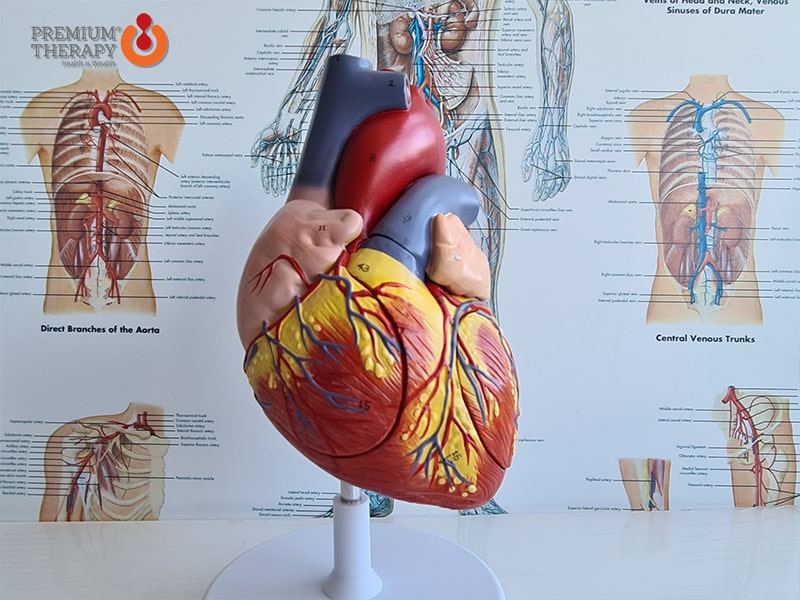Trang chủ / Thông tin y học
Phụ nữ khi ở tuổi mãn kinh, các vấn đề như: nóng nảy, mất ngủ, loãng xương,… xảy ra thường xuyên hơn. Nhiều chị em phụ nữ lựa chọn sử dụng Hormone Replacement Therapy (Liệu pháp thay thế hormone). Vậy chính xác Hormone Replacement Therapy là gì? Liệu pháp thay thế hormone có an toàn không và khi nào thì nên sử dụng? Mời bạn cùng Premium Therapy tìm hiểu trong bài viết dưới đây nhé.
Hormone Replacement Therapy là một phương pháp được sử dụng điều trị các triệu chứng (tiền) mãn kinh và giúp bảo vệ sức khỏe lâu dài. Liệu pháp này có thể giúp làm giảm các triệu chứng về thể chất và tinh thần của thời kỳ mãn kinh, đổ mồ hôi trộm, bốc hỏa và giảm nguy cơ tiêu xương. Tùy thuộc vào độ tuổi, tình trạng sức khỏe của người bệnh mà bác sĩ sẽ xác định liệu pháp điều trị phù hợp.
Hormone Replacement Therapy (HRT) được dùng để điều trị các triệu chứng xảy ra trong thời kỳ (tiền) mãn kinh của phụ nữ. Khi bước vào giai đoạn mãn kinh, hai hormone nữ là estrogen và progesterone giảm mạnh dẫn tới các triệu chứng như thay đổi tâm trạng, khó ngủ, làm tăng nguy cơ loãng xương, khô âm đạo, đau đớn khi quan hệ tình dục.
Liệu pháp thay thế hormone có thể giúp bạn làm giảm những triệu chứng trên. Bác sĩ sẽ chỉ định dùng estrogen hoặc progesterone ở dạng tổng hợp nhằm giúp điều hòa vòng kinh. Việc bổ sung thêm hai nội tiết tố này giúp giảm các triệu chứng mãn kinh bao gồm cả thể chất và tinh thần, đồng thời ngăn ngừa nguy cơ loãng xương.
Liệu pháp này có nhiều dạng khác nhau như miếng dán da, gel bôi, kem bôi, viên nang uống và viên đặt âm đạo. Trong đó, phương pháp thẩm thấu qua da – đưa trực tiếp vào máu, giúp giảm nguy cơ chuyển hóa được đánh giá là biện pháp tốt nhất.

Liệu pháp hormone toàn thân hay liệu pháp tại chỗ sẽ có những lợi ích khác nhau.
Estrogen toàn thân thường có trong thuốc viên, gel, kem, miếng dán da hoặc dạng xịt.
Theo nghiên cứu, việc kết hợp estrogen và progesterone có thể làm giảm nguy cơ ung thư ruột kết. Ngoài ra, bổ sung estrogen còn giúp làm giảm nguy cơ mắc bệnh Alzheimer, tăng cường trí nhớ, tăng tưới máu não và tăng ham muốn tình dục.
Khi điều trị theo liệu pháp kết hợp, bác sĩ sẽ cân nhắc áp dụng theo 2 loại phác đồ sau:
Liệu pháp hormone tại chỗ có dạng viên, dạng vòng hoặc dạng kem.
Bác sĩ thường sẽ kê toa estrogen cùng với progesterone đối với trường hợp chưa cắt bỏ tử cung. Bởi nếu estrogen không có progesterone cân bằng sẽ kích thích sự phát triển của niêm mạc tử cung, làm tăng nguy cơ ung thư tử cung. Và ngược lại, bạn không cần phải dùng progesterone.

Bên cạnh những lợi ích thì vẫn còn tồn tại những nguy cơ rủi ro cao. Việc kết hợp giữa hai hormone – estrogen và progesterone có thể làm tăng nguy cơ mắc các bệnh sau:
Các nghiên cứu cũng chỉ ra rằng, có nhiều yếu tố dẫn đến các rủi ro trên như độ tuổi, liệu pháp sử dụng, liều lượng và loại estrogen, cũng như các yếu tố sức khỏe khác như tiền sử bệnh lý và tiền sử gia đình. Vì vậy, khi lựa chọn liệu pháp thay thế hormon bạn nên trao đổi với bác sĩ và cân nhắc các rủi ro trên.
Mặc dù tiềm ẩn nhiều rủi ro về sức khỏe, estrogen toàn thân vẫn là phương pháp điều trị các triệu chứng mãn kinh hiệu quả nhất.
Và không thể phủ nhận lợi ích của liệu pháp thay thế hormone cho các trường hợp sau:
Phụ nữ trải qua thời kỳ mãn kinh sớm, đặc biệt là những người đã cắt bỏ buồng trứng và không dùng liệu pháp estrogen cho đến khi ít nhất 45 tuổi, có nguy cơ cao mắc các bệnh như:
Trong trường hợp này, lợi ích bảo vệ của Hormone Replacement Therapy thường cao hơn rủi ro. Người bệnh nên xin tư vấn từ bác sĩ để tìm ra phương pháp điều trị phù hợp.
Phụ nữ đã từng mắc các bệnh sau không nên dùng Hormone Replacement Therapy:

Phụ nữ mãn kinh sau 45 tuổi hoặc không bị các triệu chứng mãn kinh nặng thì không cần điều trị bằng hormone. Tuy nhiên, người bệnh nên tư vấn bác sĩ về các phương pháp làm giảm nguy cơ mắc bệnh khác như loãng xương và bệnh tim. Thay đổi lối sống khỏe mạnh và các loại thuốc khác ngoài liệu pháp hormone cũng có thể giúp bảo vệ sức khỏe lâu dài.
Một lối sống lành mạnh, hạn chế đồ uống chứa caffeine và rượu bia, tập thở nhịp nhàng hoặc các bài tập thư giãn khác có thể giúp kiểm soát cơn bốc hỏa ở tuổi mãn kinh. Đối với các trường hợp gặp vấn đề về âm đạo, bác sĩ sẽ kê đơn một số loại kem dưỡng ẩm hoặc chất bôi trơn âm đạo hoặc thuốc ospemifene (Osphena) giúp giảm đau khi giao hợp.

Trong bài viết này, chúng ta đã tìm hiểu về hormone replacement therapy (HRT) – một phương pháp điều trị phổ biến cho các triệu chứng liên quan đến sự suy giảm hormone trong cơ thể. HRT không chỉ giúp cải thiện chất lượng cuộc sống của người dùng bằng cách giảm các triệu chứng không mong muốn như suy giảm tinh thần, khô âm đạo và các triệu chứng mãn kinh khác, mà còn có thể giúp ngăn ngừa một số bệnh liên quan đến sự giảm hormone. Tuy nhiên, việc sử dụng HRT cần được thảo luận và giám sát chặt chẽ với bác sĩ chuyên khoa để đảm bảo an toàn và hiệu quả. Hãy liên hệ với chuyên gia y tế của bạn để biết thêm thông tin chi tiết và tư vấn cá nhân hóa về hormone replacement therapy.
Hiện nay, Premium Therapy là đối tác hợp pháp duy nhất trong khu vực Đông Dương của các cơ sở y tế uy tín tại CHLB Đức. Chúng tôi chuyên cung cấp các dịch vụ chăm sóc sức khỏe và khám chữa bệnh tại Đức. Nếu quý khách hàng có nhu cầu tư vấn về các dịch vụ điều trị y tế tại CHLB Đức. Vui lòng liên hệ Hotline 09 119 10 119 hoặc đăng ký tại đây để được hỗ trợ chi tiết nhất.
CÔNG TY CP PREMIUM THERAPY – Đại diện các Trung tâm trị liệu & Bệnh viện uy tín hàng đầu CHLB Đức tại Đông Dương: